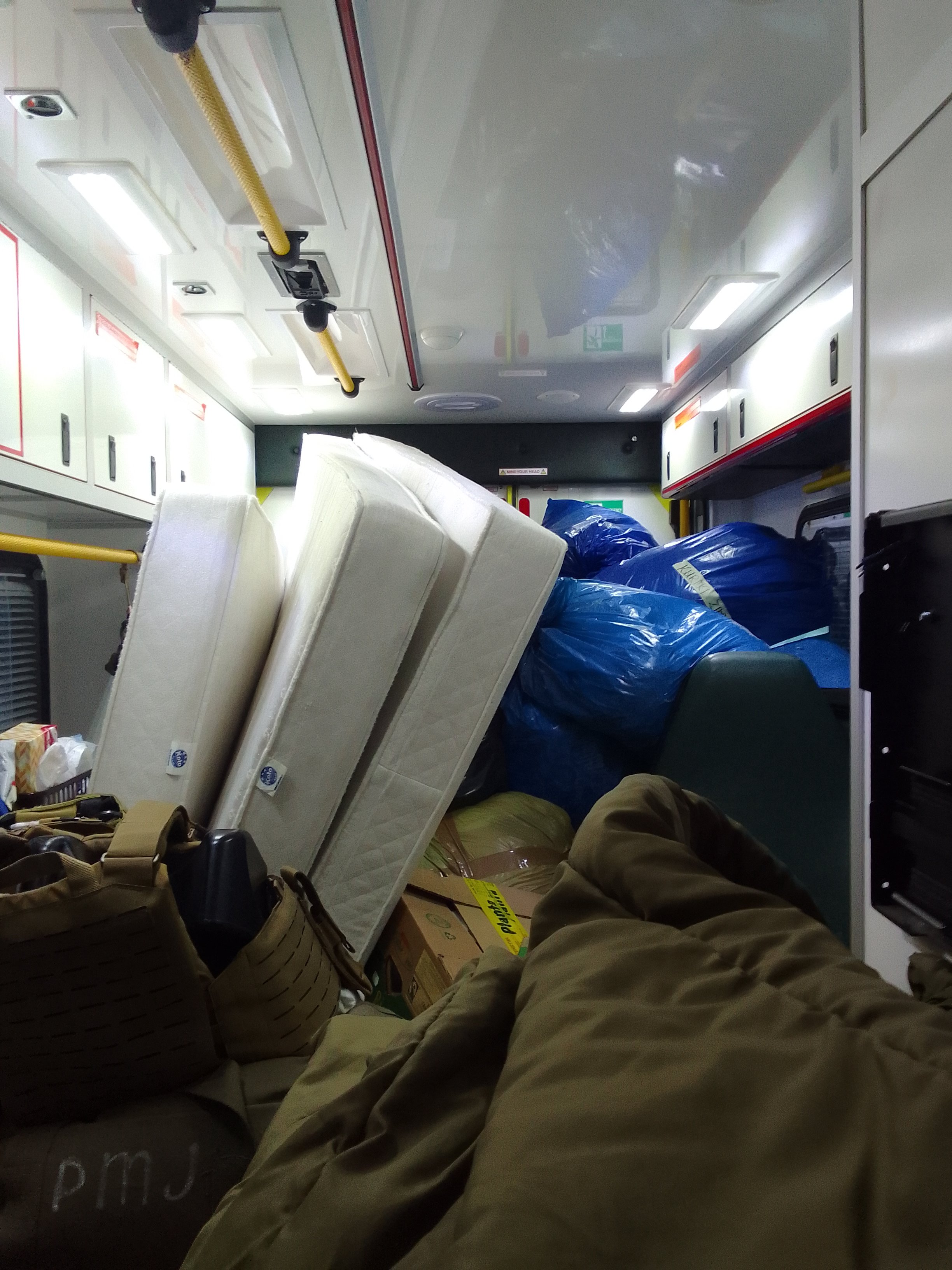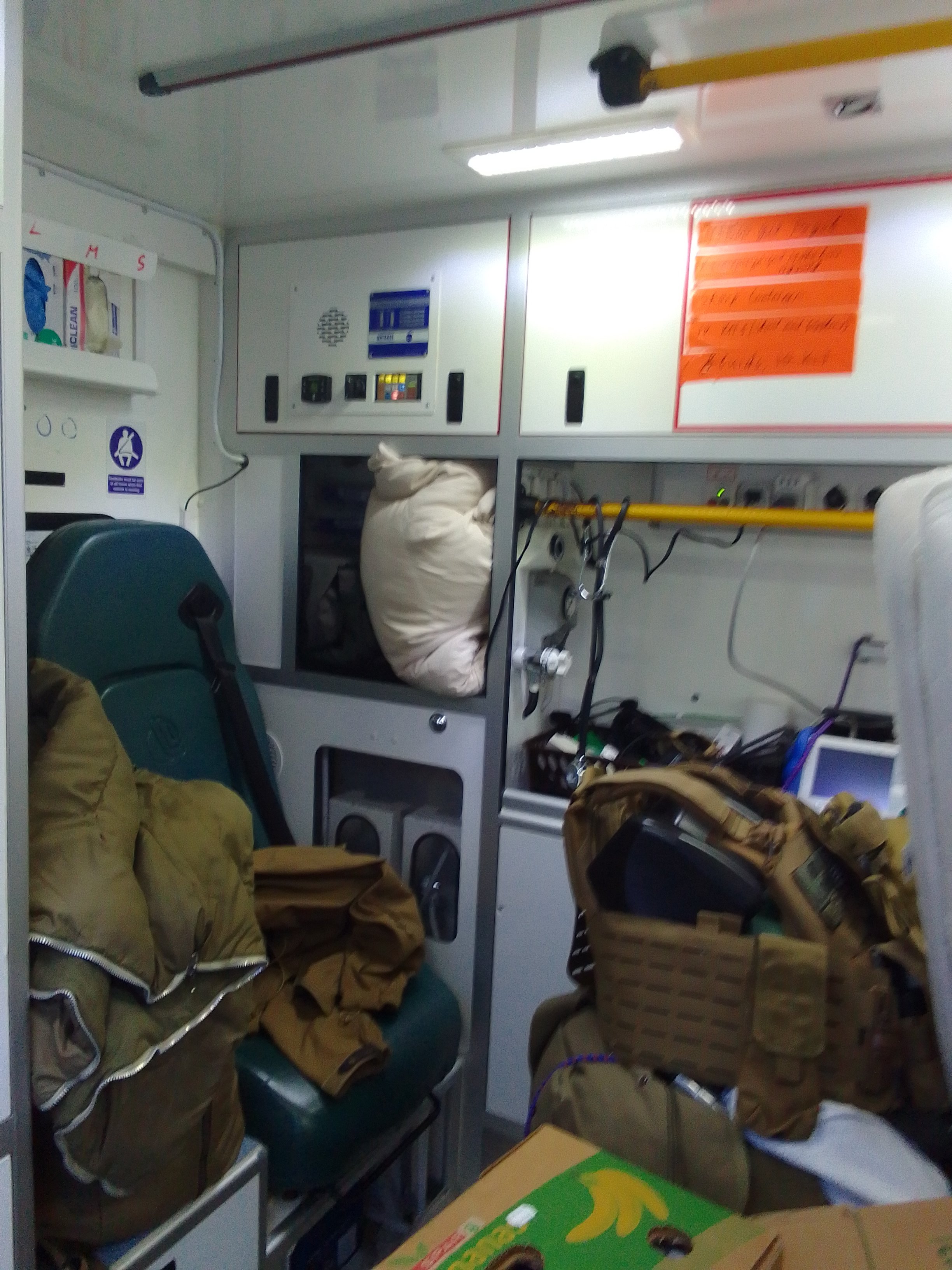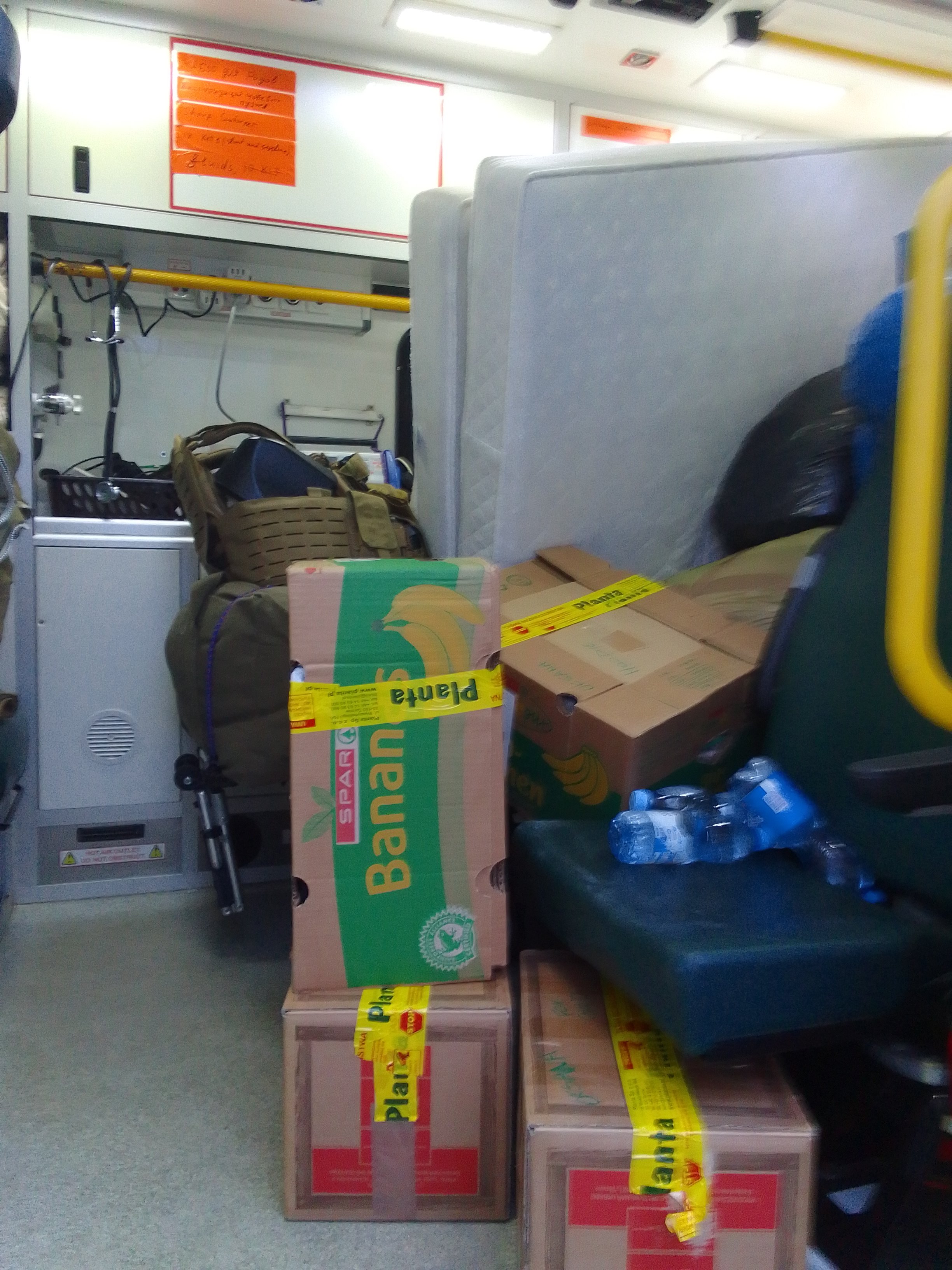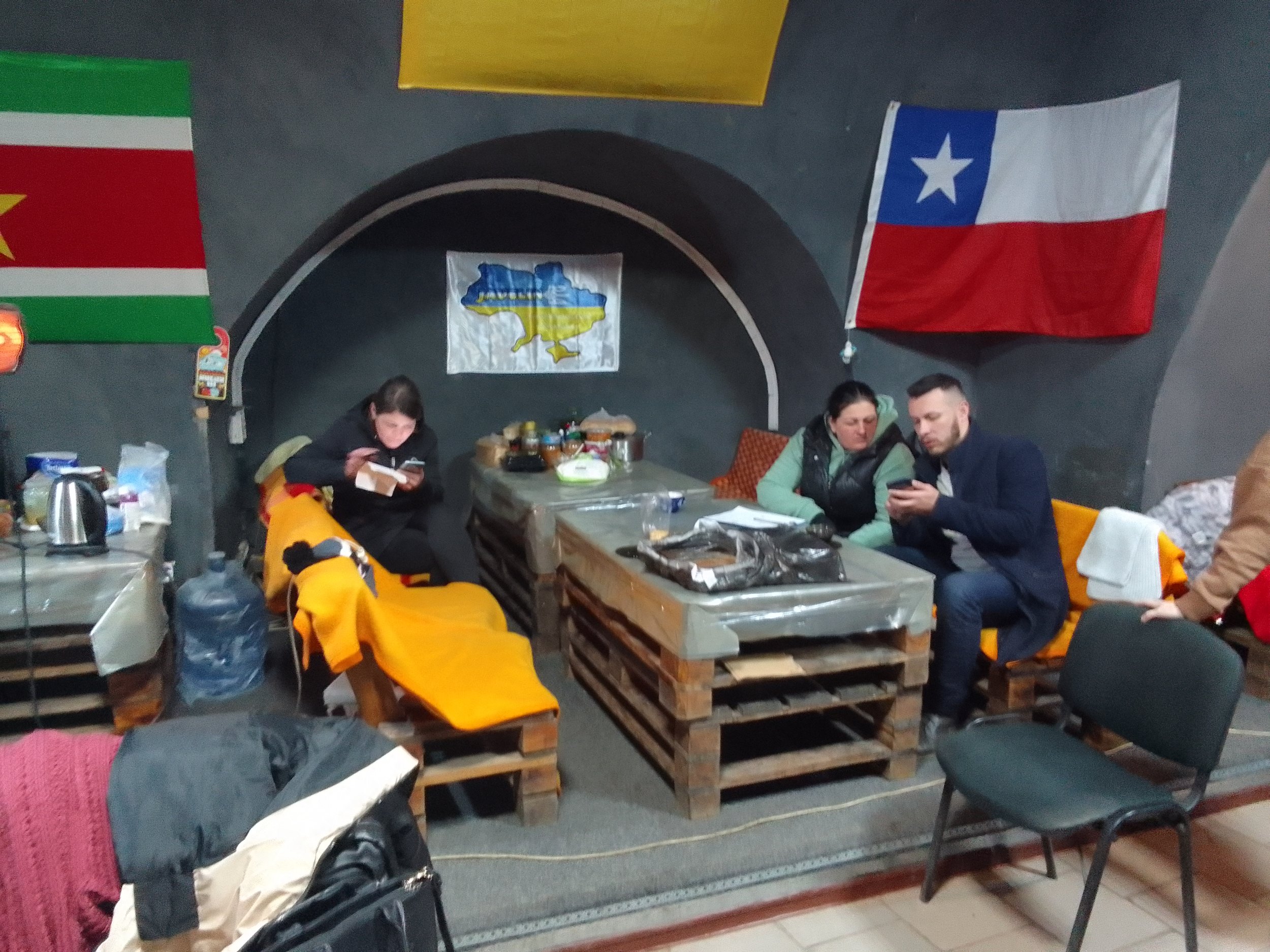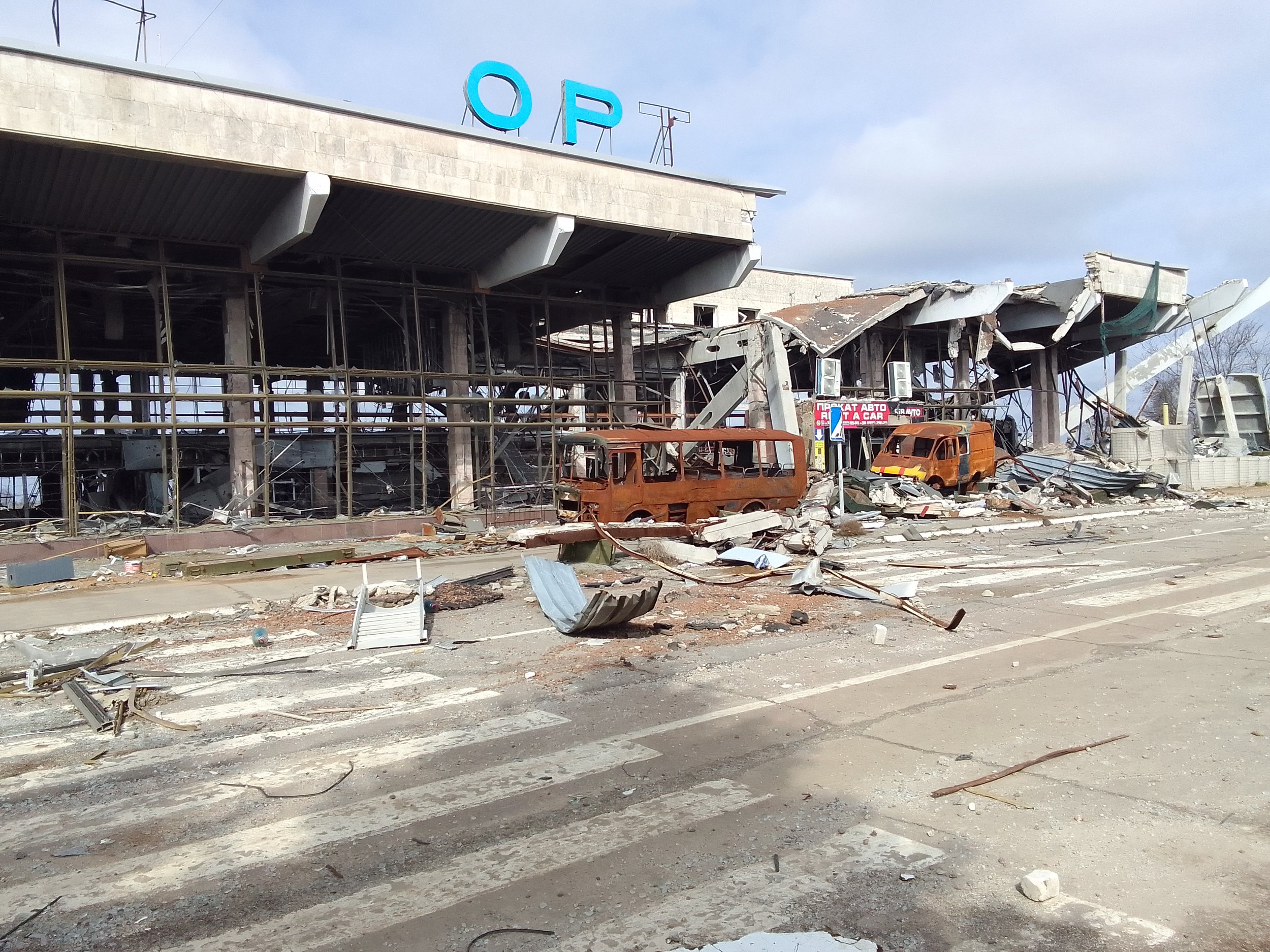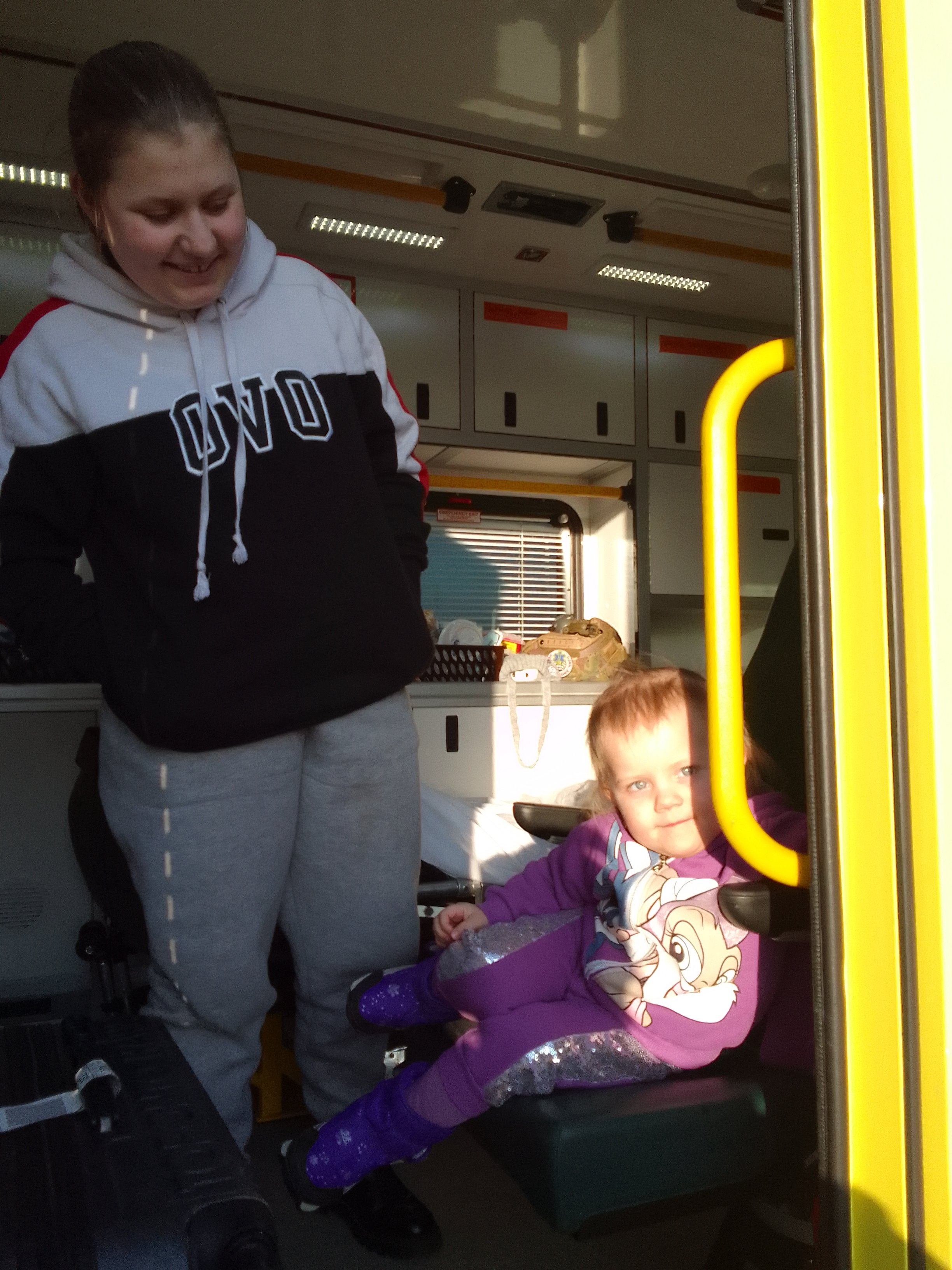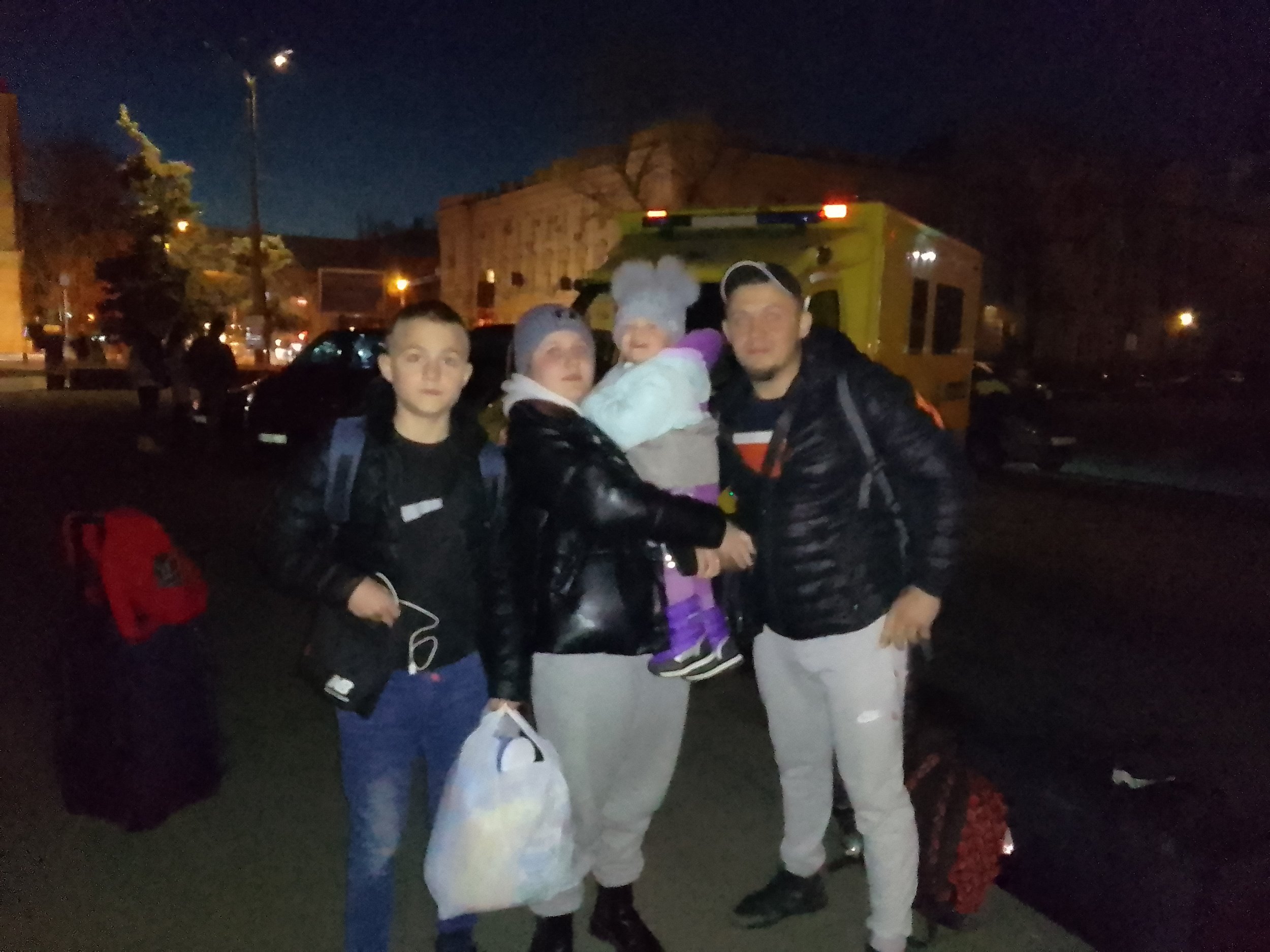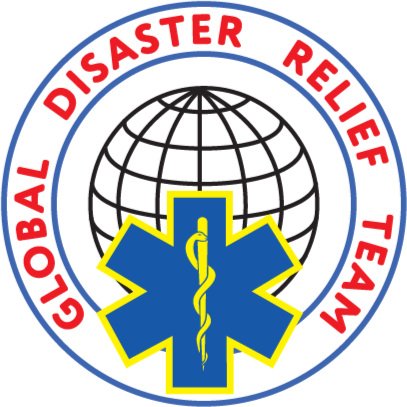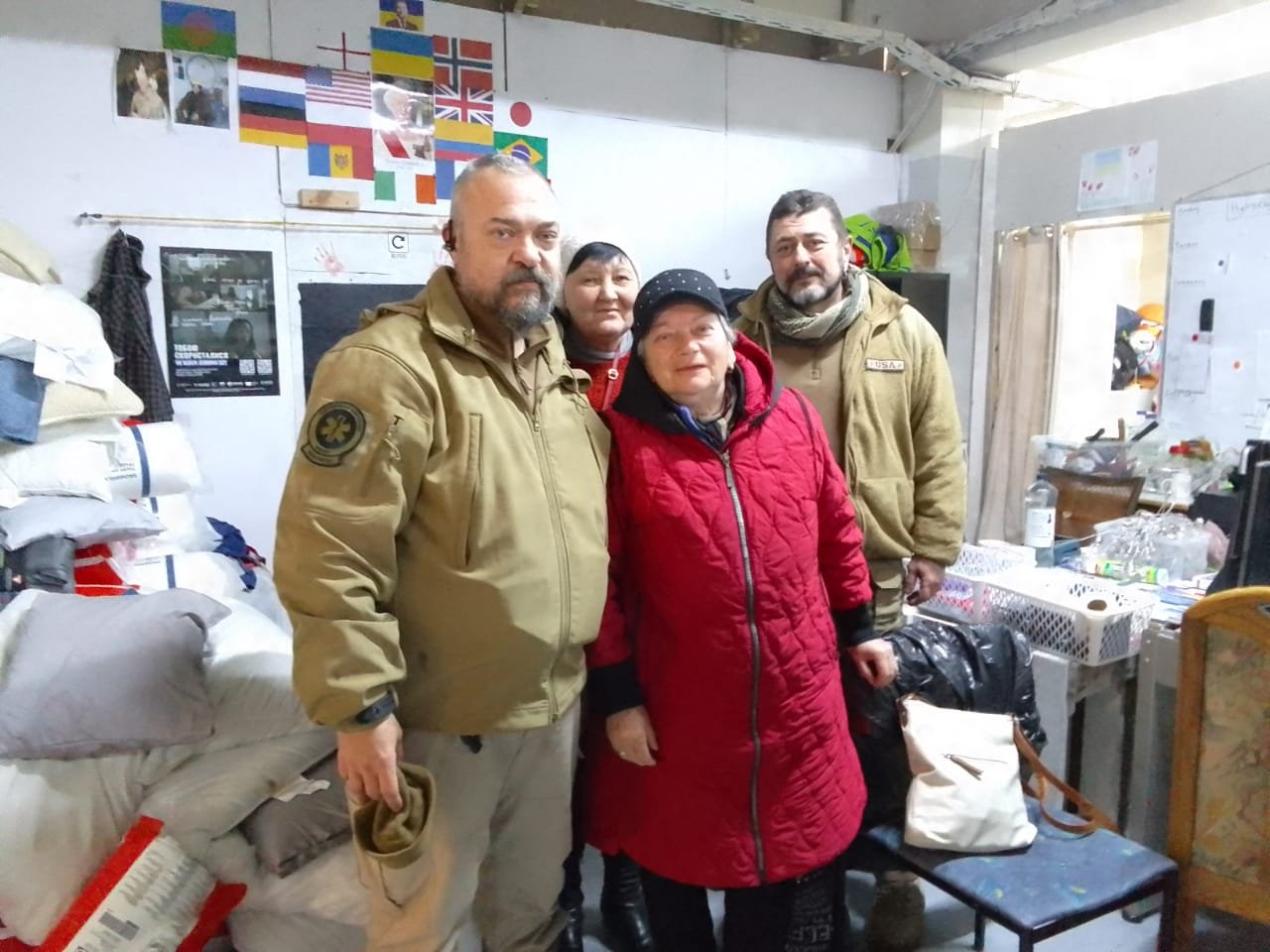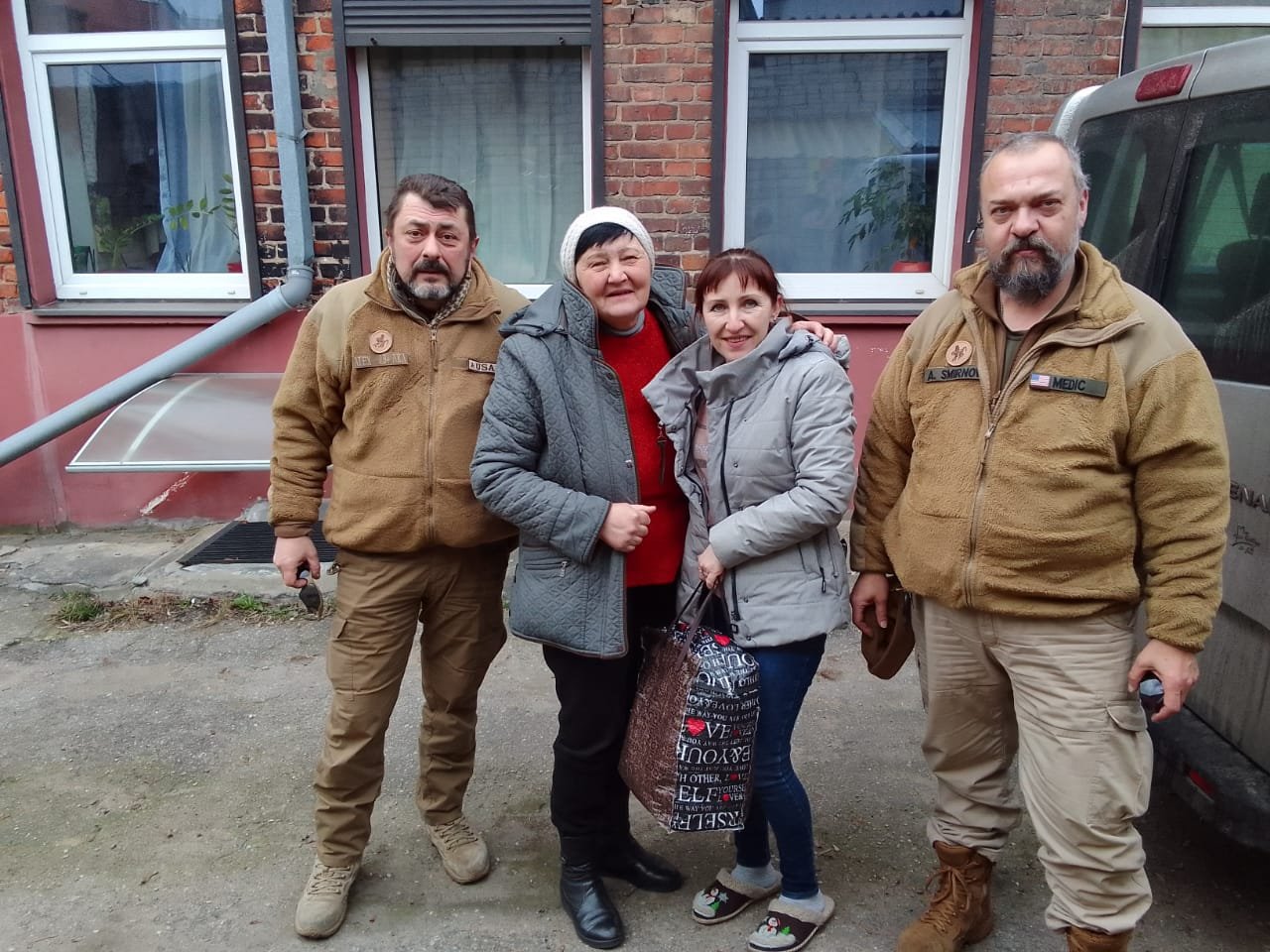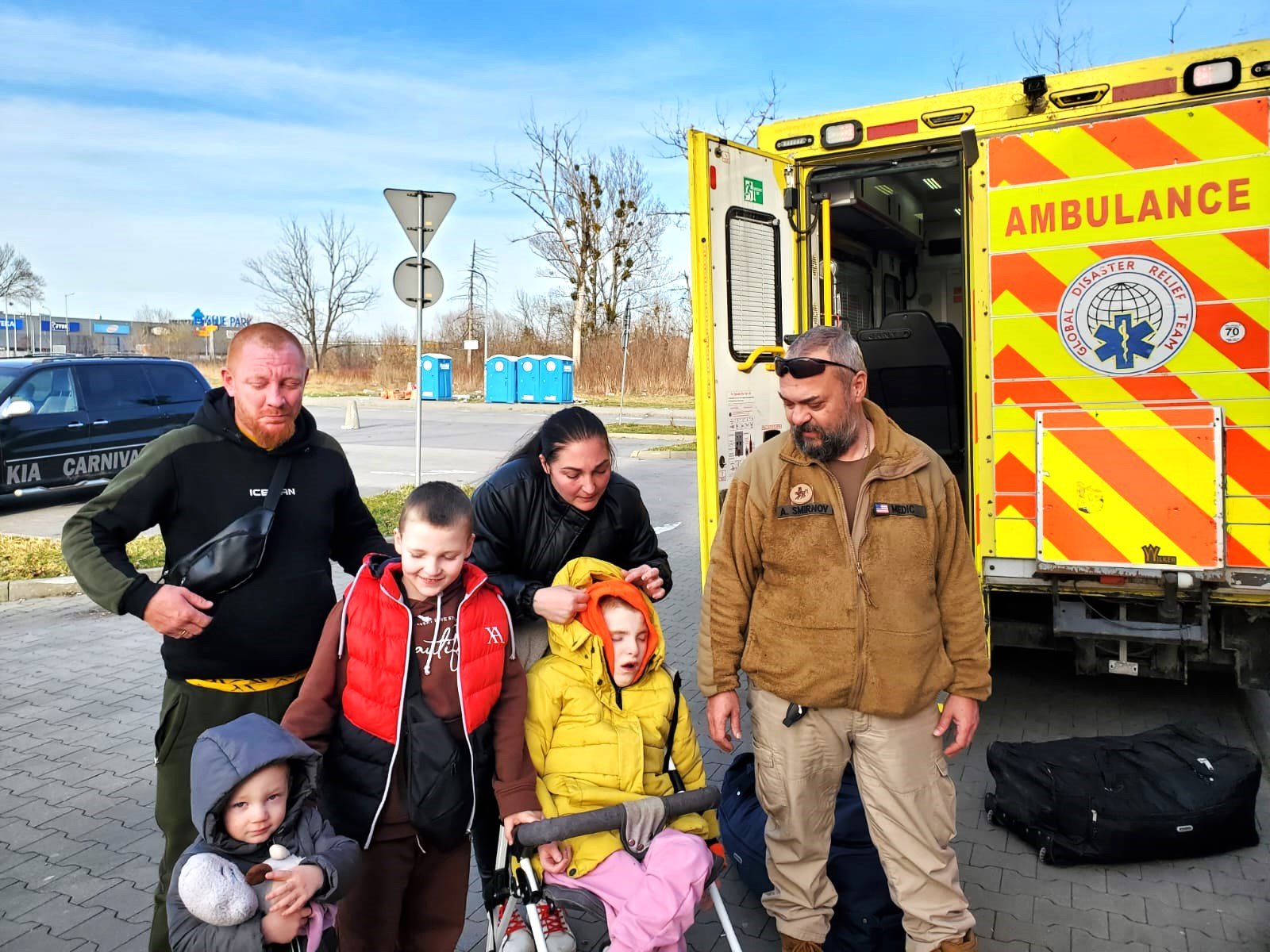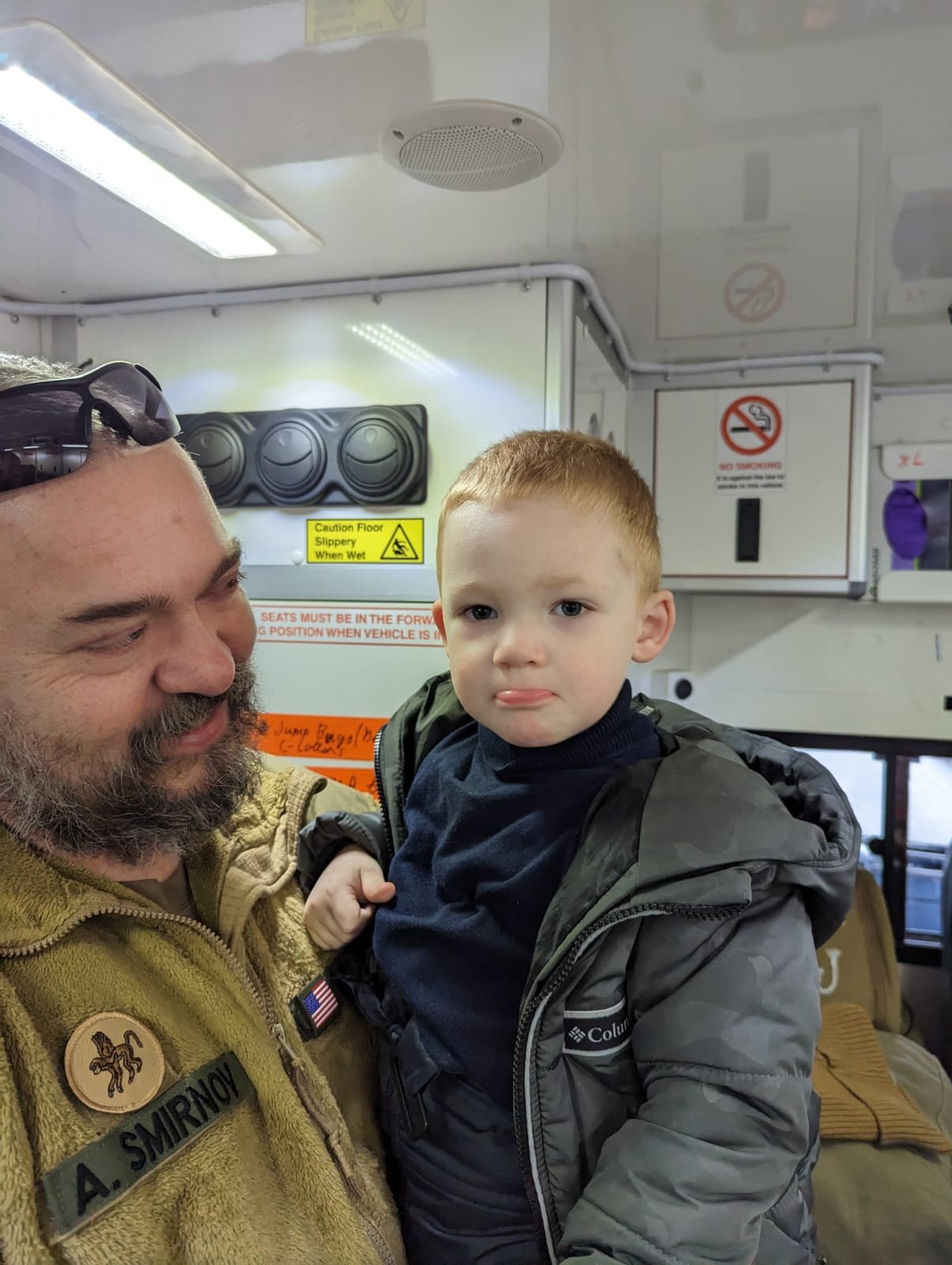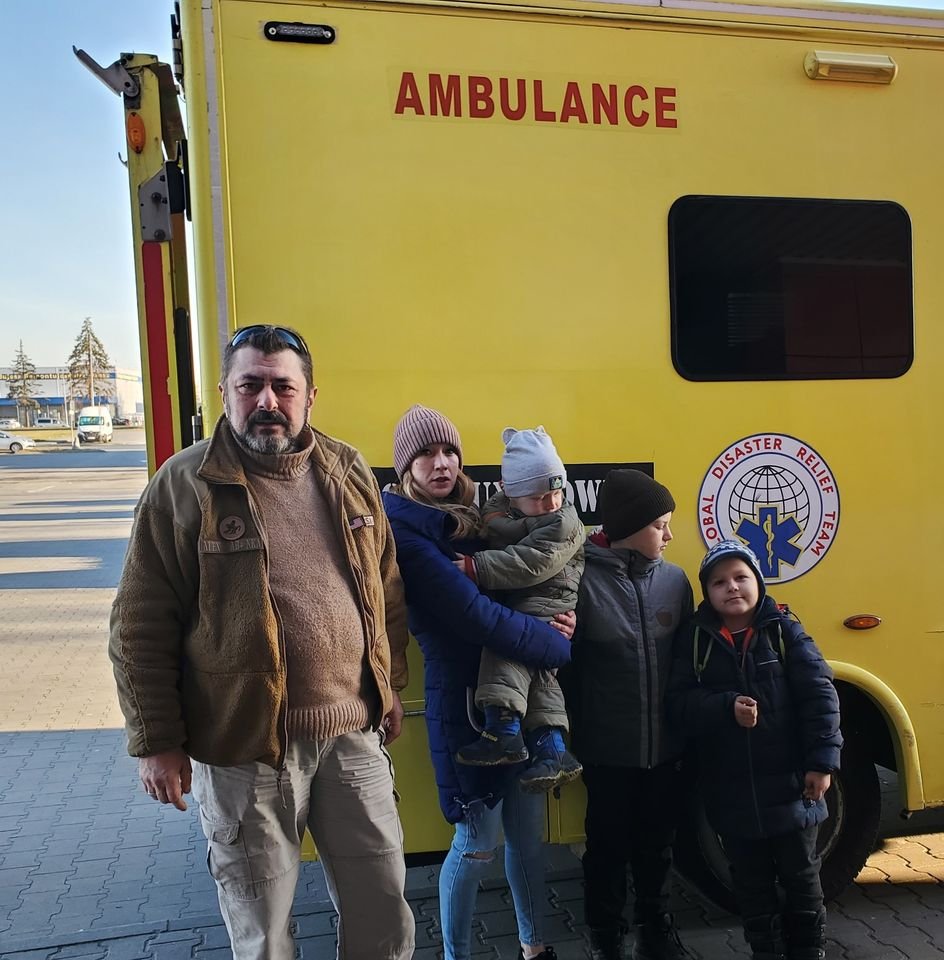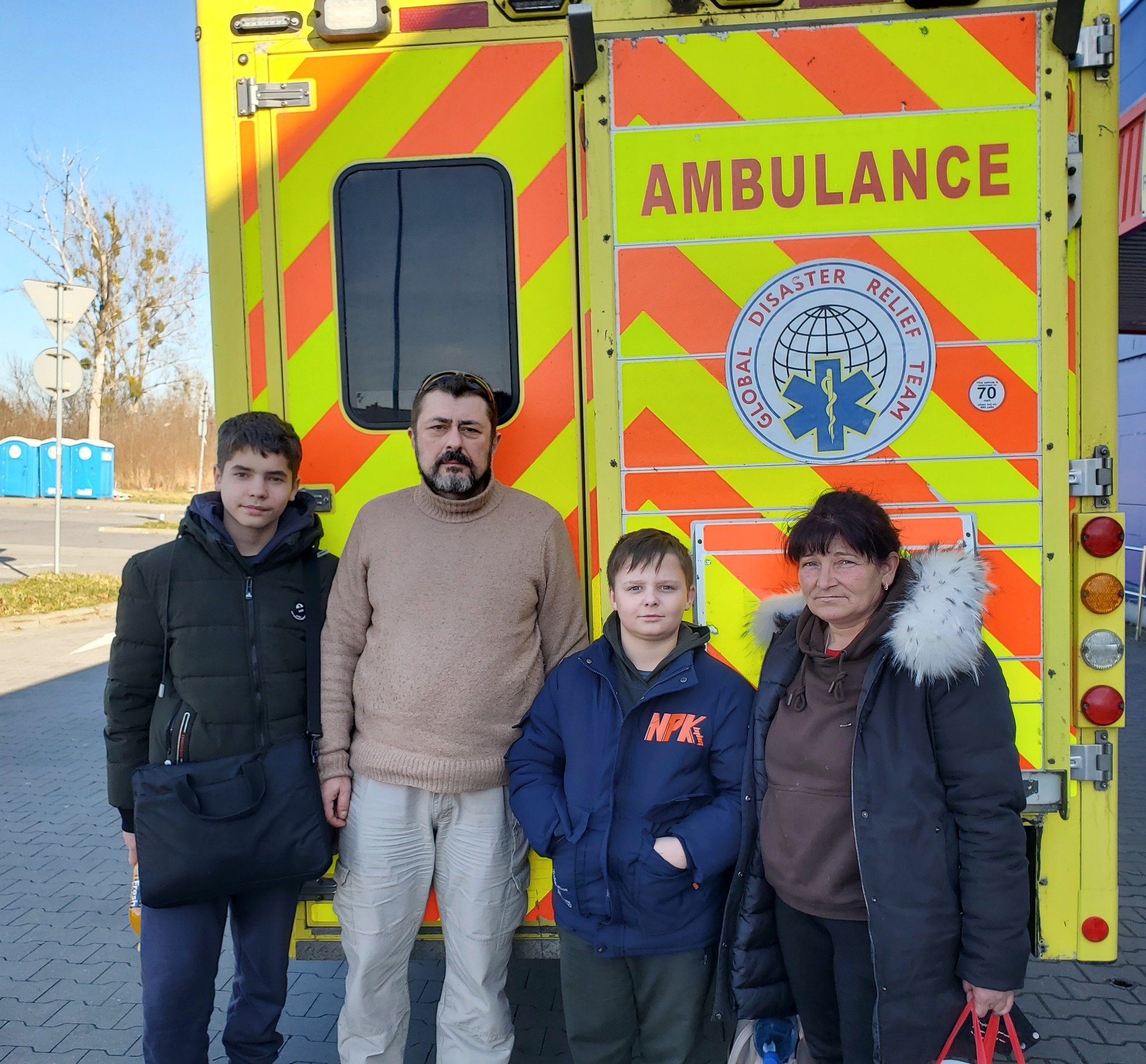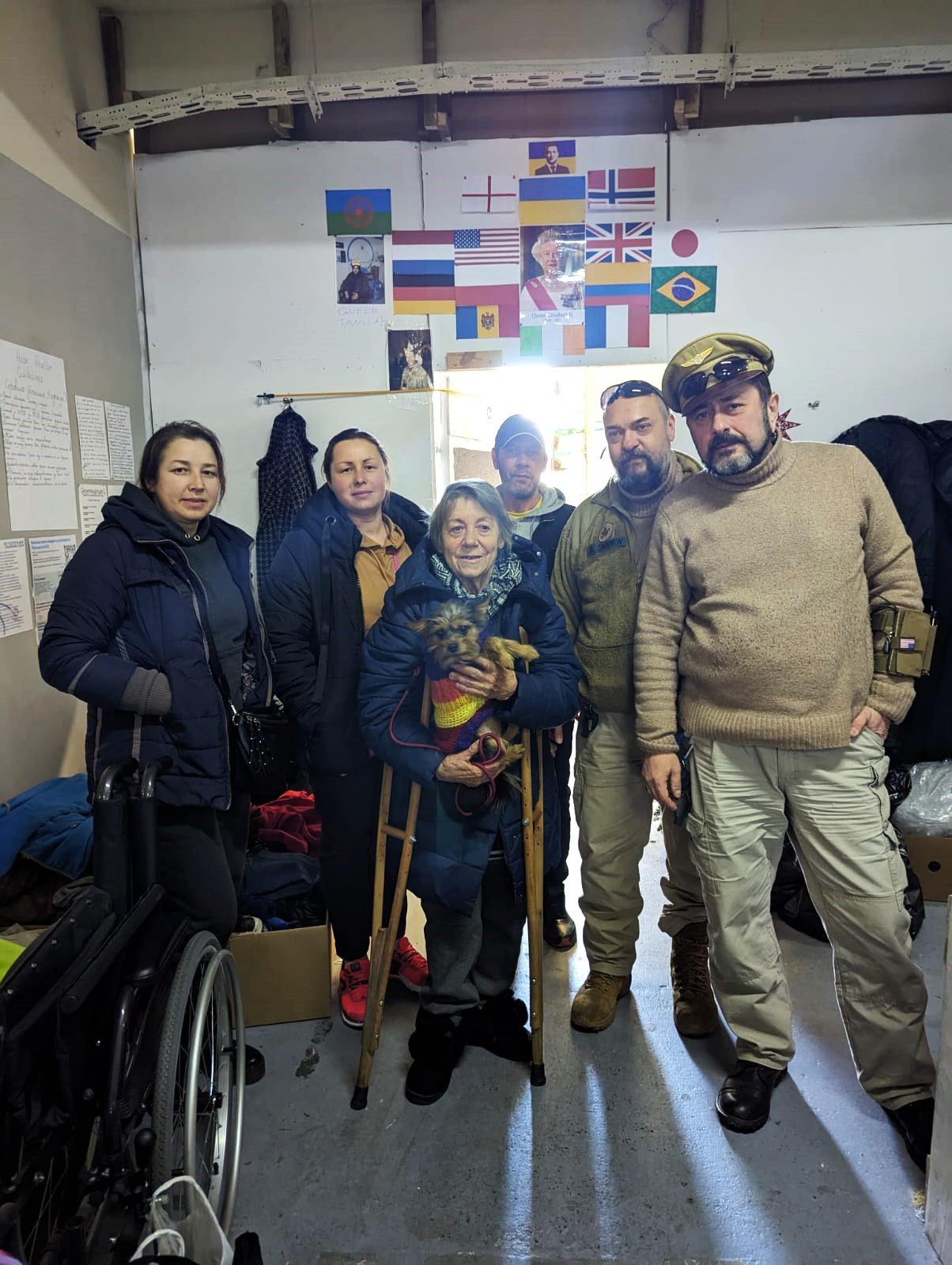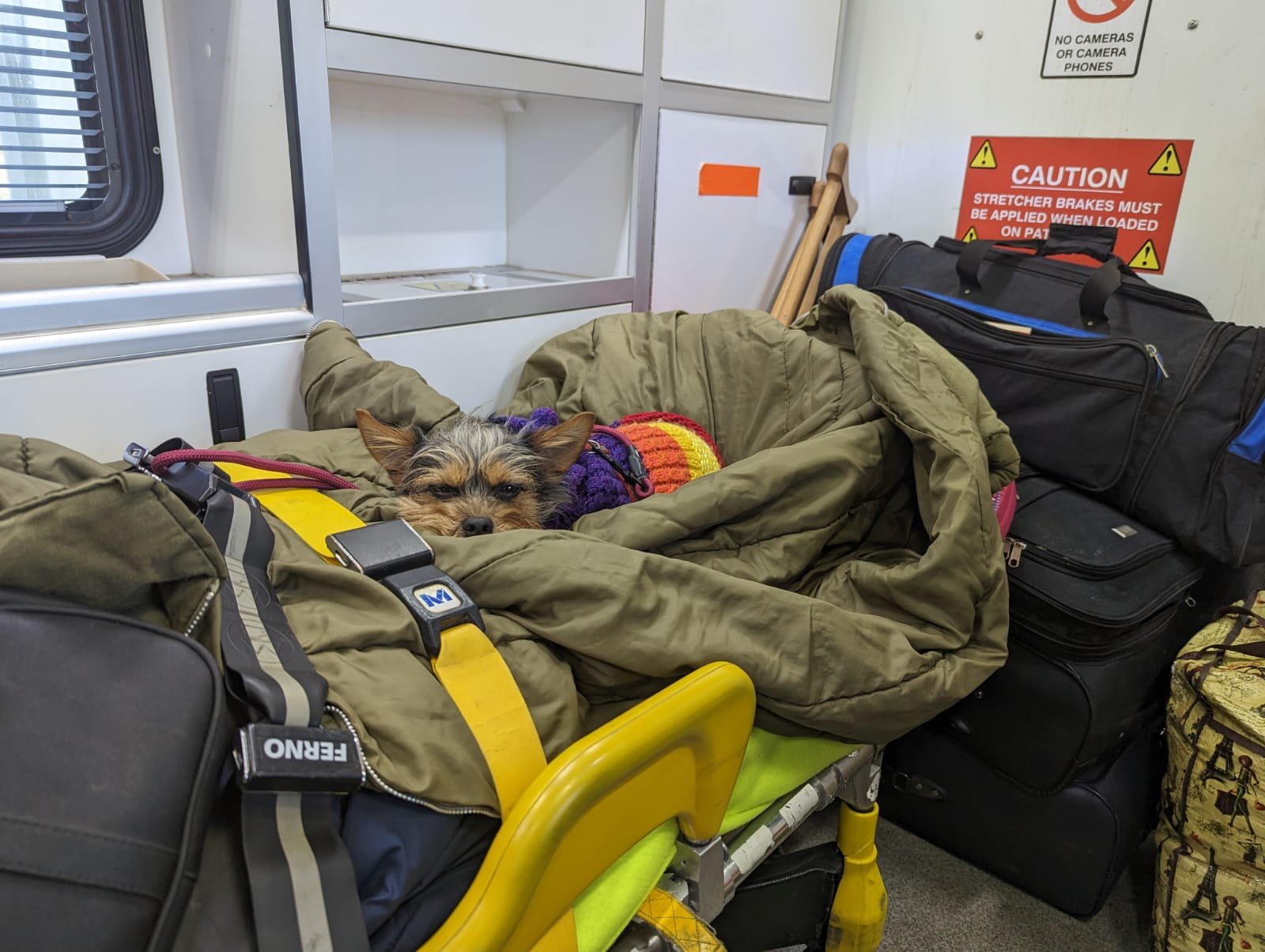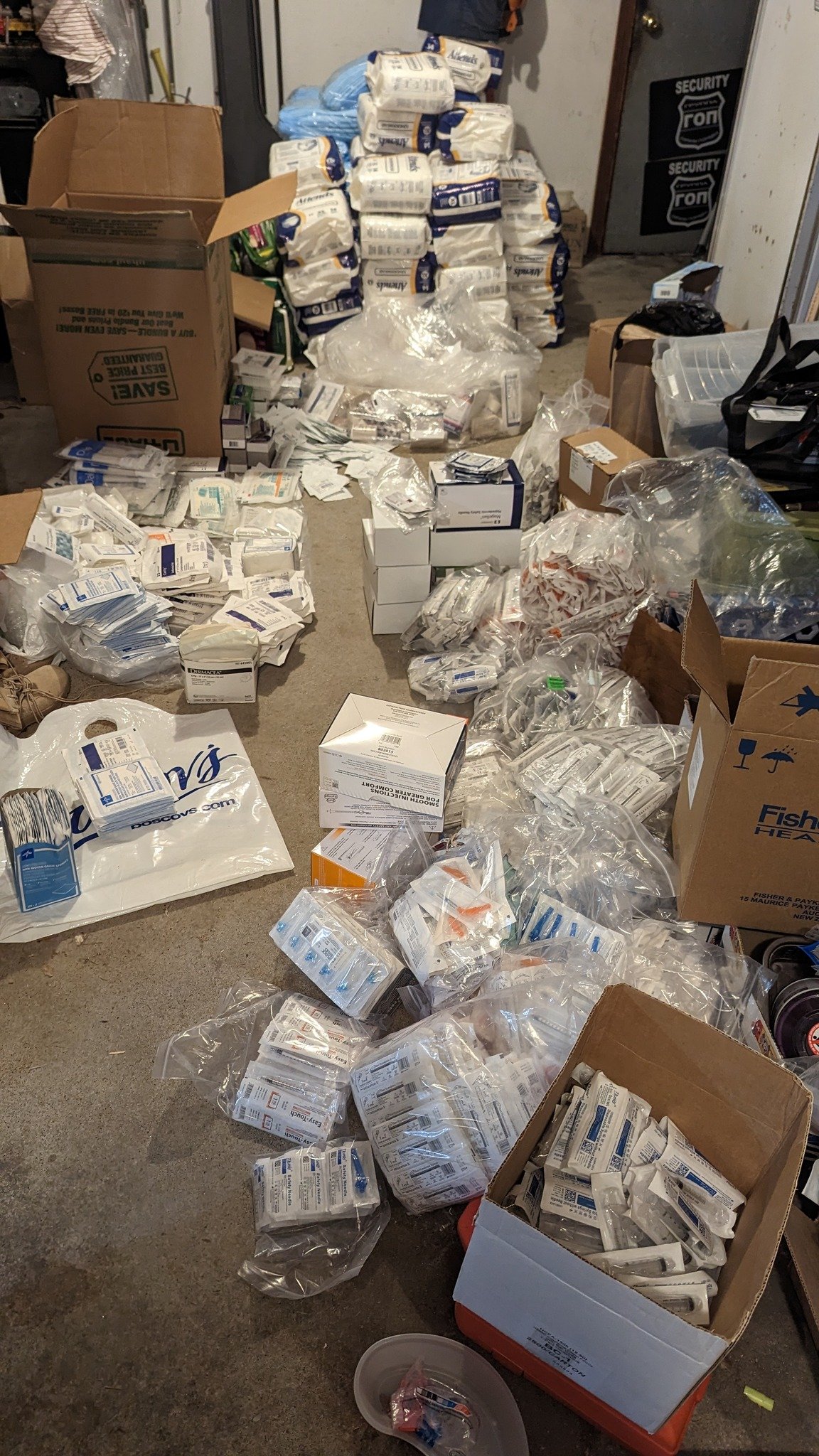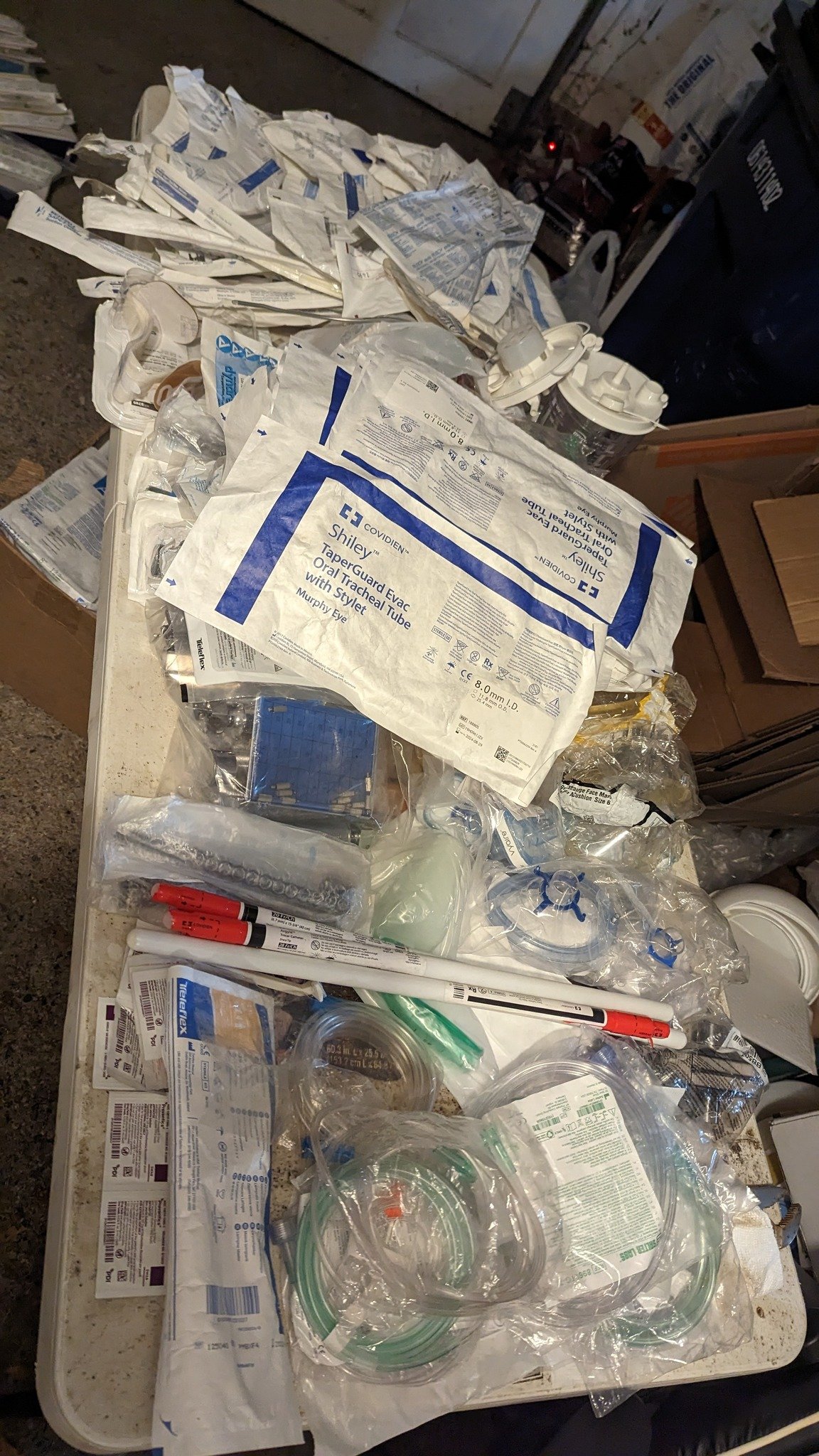March 2023 Update
————————————————————————————————————
March 26 -March 30 (five days)
Kherson (Ukraine) – Przemyśl(Poland) – Kaunas (Lithuania)
Total distance: 4028 km
Total cost: $1526
This was a very long and nerve-racking mission. Our ambulance, "Nika," is in the repair shop due to a rear suspension problem caused by the toll that the Ukrainian roads take on it. So, we used our passenger van, "Juna," instead. It is much more fuel-efficient and can be driven at the speed of 160 km/h (100 mph).
We left the base at six o'clock in the morning, crossed the border and were able to maintain a pretty good speed for the most part of the day. However, after Odessa, we had to slow down due to the poor and bumpy roads and detours through completely destroyed parts. We arrived at Kherson well after curfew and had a couple of conversations with block posts and patrols about why we were still on the road. We spent the night at a local hotel that fortunately had power and hot water. During the night, Russians bombarded the city twice, but we were too tired to pay attention to such minor details.
In the morning, we picked up our clients - two elderly women with limited mobility. When we passed Chernobaevka, one of them pointed to the ruins surrounded by a fence and said, "This used to be my son's house. He built it recently, two stories. It was destroyed by the Russians' tank fire."
We arrived at Przemyśl, dropped off our clients at the shelter. One of them would go to Gdansk by train, and the other one, we would take to Kaunas.
The next morning, we picked up our client and started towards Kaunas. About halfway, we stopped to get fuel and noticed steam coming from the engine. It turned out that the coolant hose had a crack, and we were about 500 kilometers from our destination. We evaluated our options and decided to continue driving, stopping every thirty minutes to add coolant. Alexander Zharov was driving, and I contacted our volunteer network and asked them to find me a good, reliable mechanic in Kaunas (if we would be able to make it there). In a couple of hours, I received a contact of Vytautas Gustaitis and was told that he would arrange everything. All the time, I was hoping the engine would not seize. By the time we reached Kaunas we used about 25 liters of coolant.
We brought our client to her daughter and went to meet with Vytautas. He is incredible. He runs an animal shelter in Kaunas, trains dogs for the police, helps Ukrainian shelters, and teaches Ukrainian K-9 officers. He had already talked to a mechanic, and we dropped off "Juna" at the shop.
The next day, we got "Juna" back late in the evening, returned to the hotel, and in the morning, went back to the base.
————————————————————————————————————
March 21 -March 24
Warsaw (Poland) – Ingolstadt (Germany)
Total distance: 2651km
Total cost: $1801
This mission was the product of long and hard planning and cooperation between GDRT (Project Monkey Jump) and Rubikus. Additionally, Dasha from RFU accompanied us on the ride because I needed extra hands.
Our patient is a 63-year-old woman who is paralyzed on one side after a stroke, and she has a lot of other medical problems. She is bedridden. But the worst part is that she was evacuated from Mariupol, which is still occupied by Russians. We picked her up in Warsaw after she spent almost 72 hours on the road, but I cannot provide more details for obvious reasons. The people who brought her to us are real heroes – they would be prosecuted by the Russian government, but they continue to help Ukrainians.
————————————————————————————————————
March 19
Today was supposed to be our day off. We got up around ten and were enjoying our coffee when we got a call from Lviv: “Could you come and pick up the family with three kids, one of whom has cerebral palsy?” So, off we went.
The kids were two and a half, nine, and eleven years old. It was obvious that they were very loved by their parents. When we crossed the border, the nine-year-old suddenly asked me, “There will be no bombing and air raid sirens here, right?” The father also told me that he had paid off his apartment three days before the war, and now the whole building is gone. He tried to joke, “Yes, I don’t have a home, but I also don’t have any debt. It is very nice.”
We brought them to TESCO, and later they were transferred to the railroad station. I contacted the volunteers at the station and asked them to help them board the train.
I received a call about five minutes ago, and the family is on their way to Hanover.
————————————————————————————————————
March 18
Today there were two small missions. A mother from Kharkiv with three small children. Then a grandmother from Bakhmut with two, but they are older.
The grandmother from Bakhmut says that she will take care of the grandchildren in Germany and go back to look after her children and take care of them. Her son and daughter are fighting there. Her daughter is a field medic. You have read about what is happening in Bakhmut now, haven't you? It's hell there.
But when your mother is watching over you and taking care of you, everything ends well. Even in hell.
————————————————————————————————————
March 17
Another day, another pet. Today it was a dog.
We brought two parties to our friend Jay's shelter: two women and an elderly woman with her son, who is her caretaker, along with her dog. The dog was very cute but also very protective of her owner. There were some issues with the papers, but we prevailed in the end.
————————————————————————————————————
March 16
Today I will tell you a story about a cat named Motya.
Motya is a dignified, deserving cat with a family: Mama, elderly Babushka, and a girl. They are all humans. He also has a space carrier because his nerves are shaky and his character is combat-ready, but Motya won't run away from bullies.
However, he had to retreat once. He retreated from Crimea when Babushka could still walk and hadn't gone blind yet, and the girl was very young. The border guards were mean and demanded a lot of money for Motya's passage. Everyone was nervous.
They lived pretty well near Kharkov for a long time, but things started to explode and go boom, and everyone was nervous but held on. Then Babushka became very old, stopped walking and seeing, and they had to retreat again. A train took them west, and there was an unclear road ahead to Germany.
The documents for the entire family were ready, and Motya had an ID on a chip and vaccinations in addition to his passport. We met them in Lviv. It would have been difficult for Babushka to travel by bus, so our Nika came in handy. However, it wasn't easy for them even so, as they were tired after a long journey. We quickly went to the border under emergency lights to get them to rest at the Polish refugee camp as soon as possible.
The Polish border guards did not let them through. Among other things, Motya did not have a stamp for rabies vaccination, which they forgot to putt in his papers in Kharkov. Everyone was nervous then. Motya tried in every way to convey to the customs officer that the idea of rabies was absurd when it came to such a dignified cat like him, but Polish customs officials follow the law, not conscience. Perhaps it was for the best. When they start acting according to conscience, not the law, it always ends in blood and cruelty, and no one spares cats, then they eat them out of hunger.
But I digress. The Poles apologized to Motya, probably because Mama cried, and gave us all rare stamps in our passports to cancel the entry permit and handed us over to Ukrainian border guards, having given us the contact information of a veterinarian nearby in Ukraine.
To that “nearby” and back to border, I drove at that point of intersection of speed and safety that my numerous former instructors would have been proud of. It was superstitiously scary that Motya and his family would face even more new trials, and the refugee camp would close for the night.
During the interval, Motya was vaccinated, which he didn't deserve at all, and was given the coveted stamp.
At the Ukrainian border, we were greeted like family for the second time, but at the Polish border, they seemed a bit uneasy. In front of Motya, I assume. Everything was processed quickly, the paper allowing Motya's admission to the European Union was issued, and an hour later we found ourselves in a refugee camp. Where they wished us all good luck. The old grandmother, who was in a clear mind, didn't complain even once. Despite all the adventures, it was clear that Motya never had the thought of abandoning his people. They didn't either.
The camp is called "refugees", and I write "refugees".., we have all become accustomed to the word "Refugees".
This is wrong. In Ukraine, neither people nor cats run away. They retreat. For now, they retreat.
P.S.: Motya is difficult to see in the space carrier, but he is there.
————————————————————————————————————
March 14
The mission was short but no less important. We picked up two people, one disabled and one elderly woman, in Lviv and brought them to a shelter in Poland.
————————————————————————————————————
March 13
This was unexpected. In January, we received a couple of boxes of dog coats along with our medicine delivery. We were puzzled and had no idea what to do with them, so we contacted local volunteers to ask if they knew anyone who needed them. To our surprise, they enthusiastically exclaimed, "Yes, we do! Please send them to us!"
The dog coats were sent along with medical supplies.
Today, we received pictures from an animal shelter in Kharkiv, who said, "The coats just made a splash, everyone takes pictures of them. This is how the un-noble breed attracted glances in Kharkov. Thank you!"
————————————————————————————————————
March 10 - March 11
Kharkiv - Ivano-Frankivsk
Total distance: 2425km
Total cost: $851.44
On Tuesday, most of Ukraine, including Kharkiv, was heavily bombarded by Russians. When we arrived in Kharkiv on Friday evening, there was no power in our hotel, but we were grateful to still have water. The front desk lady even promised to make us coffee on a camping stove for our early departure the next day. Bless her heart! Our patient, a post-stroke victim who was paralyzed on one side, needed to go for rehab. He was located on the 12th floor, but with the power down, there was no elevator. We contacted local volunteer (@ ) and asked for help carrying him downstairs. When we arrived at the house, we received two pieces of good news: our help team was already there and the electricity had been restored three hours earlier. The bad news was that our patient wasn't ready. While we waited, we talked to the amazing local volunteers who are doing incredible work. After two hours of delay, we loaded our patient and set off for Ivano-Frankivsk, arriving around 9 pm. We unloaded our patient and began the long journey back to base in heavy snow. We finally arrived home at 2 a.m., completing a twenty-hour work day.
————————————————————————————————————
Chronicle of the New Shipment:
02.21: We arrived at Medshare (https://www.facebook.com/.../glob.../posts/1449302718933935/). "We flew out of JFK on the 21st but stopped in NJ at the Medshare warehouse to pick up about 170 lbs of medical supplies. We took some with us, and Julia Orlova brought back the rest to MA. It will be shipped very soon."
02.23: Picked up medical supplies from AnaSophia Rivera. We loaded the Suburban to the top, with no space inside left.
02.24: Started sorting and counting - syringes and needles, wound dressings, IVs, for children and adults, stabmeds, and hospital...
02.26: Realized that I can’t do with medium boxes and we need to pick up large ones. We meet with our doctors after Ukrainian meeting in Boston and loaded more gifts right at Prudential - the truck is again full.
02.27-03.04: Sorting, recalculating, pack-lists, correspondence and calls with doctors in Ukraine. Part of the goods is packed immediately for the targeted delivery - to the military hospital in Vinnytsia, and to the stabmedics to the front line to the east.
03.05-06: Packing, documents, and pack-lists for customs. 14 boxes were sent to Odessa, and one, but valuable, to Vinnytsia. Total weight: 600lbs, $1287.9.
03.07: Dr. Alexey Makogonov brought 6 more boxes from https://little-sparrows-tech.com/bili-hut-global for the perinatal center in Kyiv. I prepared accompanying documents for customs and managed to send everything with the previous 15 on the same plane. 35 lbs, $250.
Далi будє.
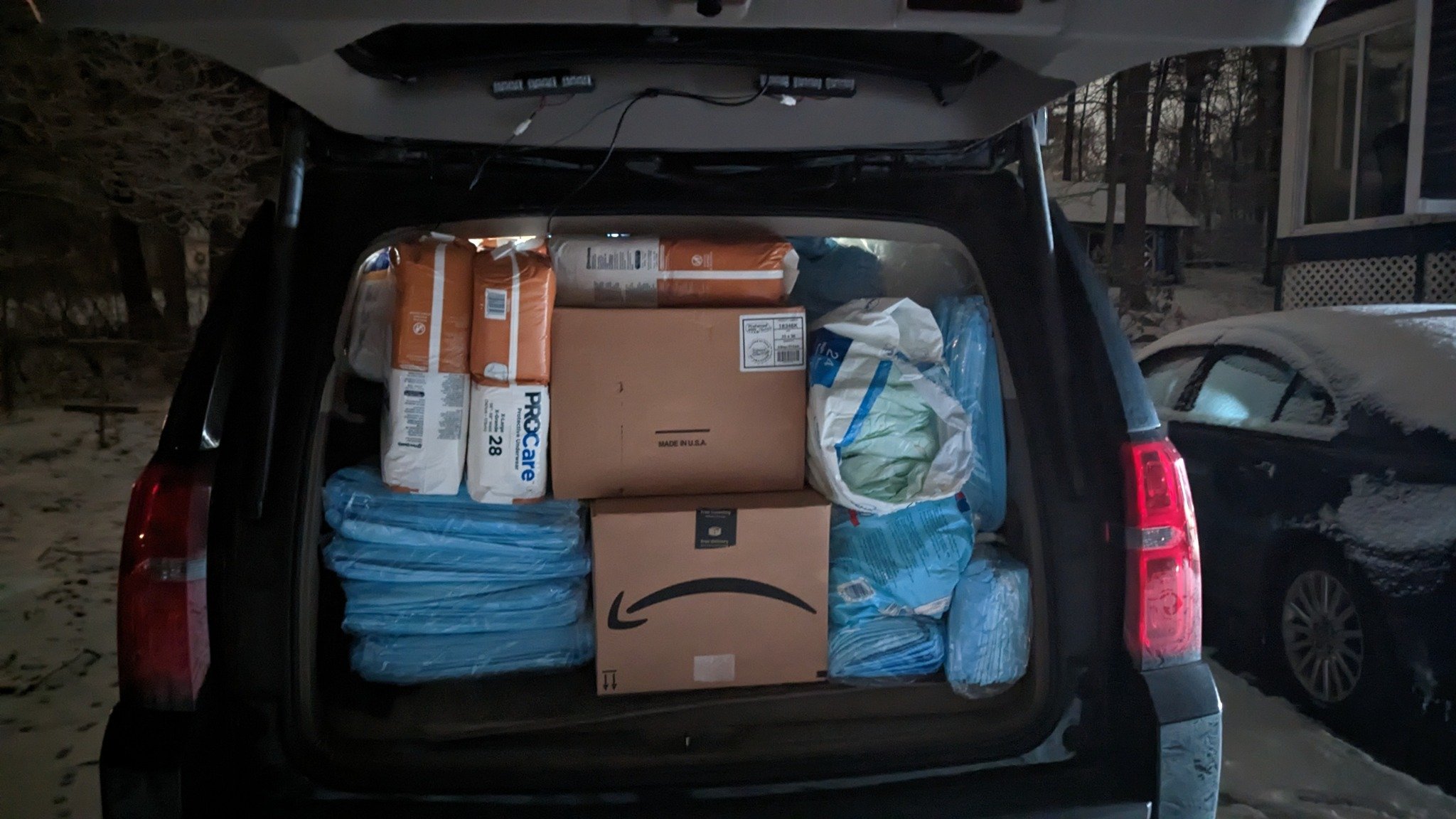
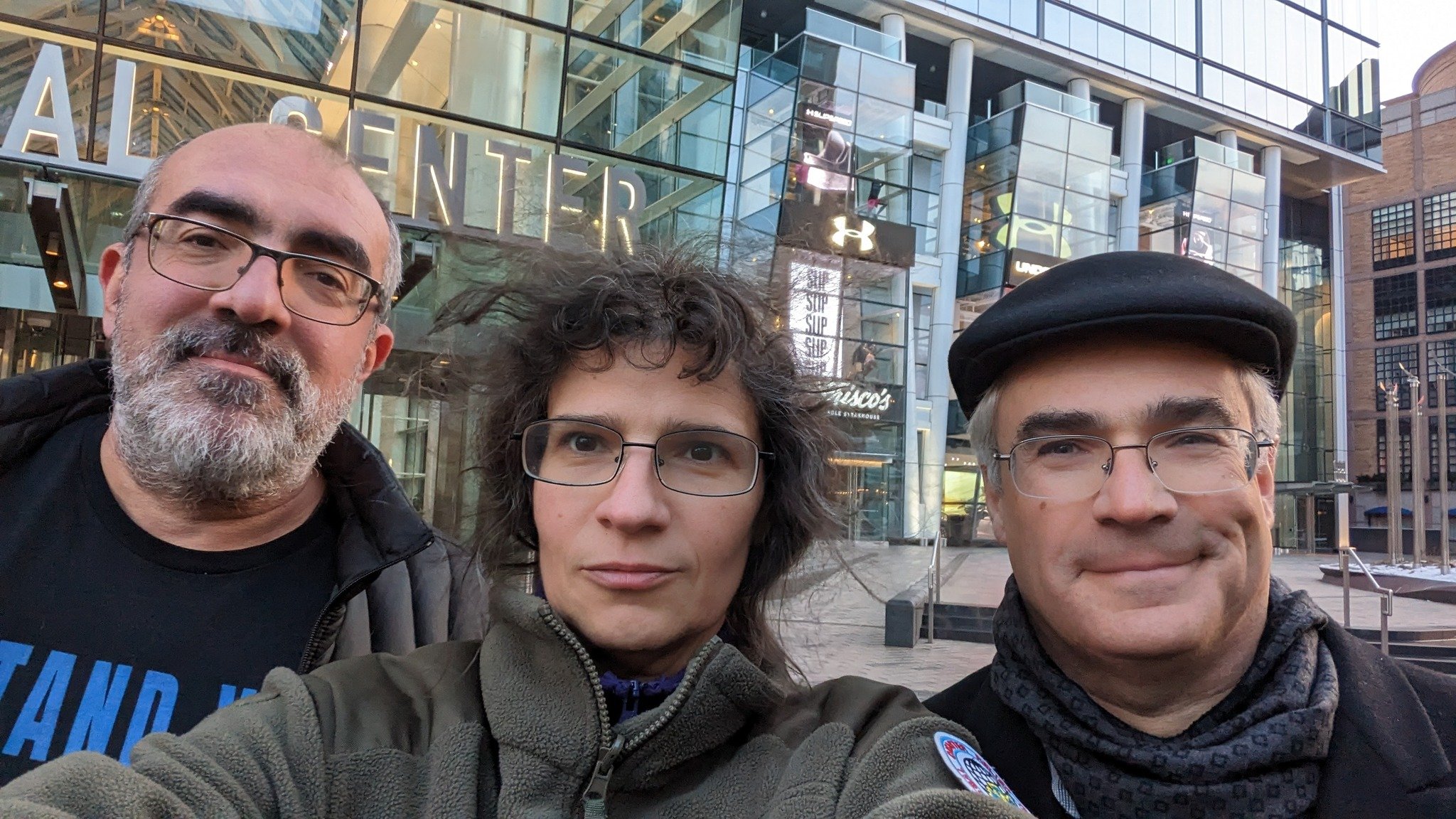
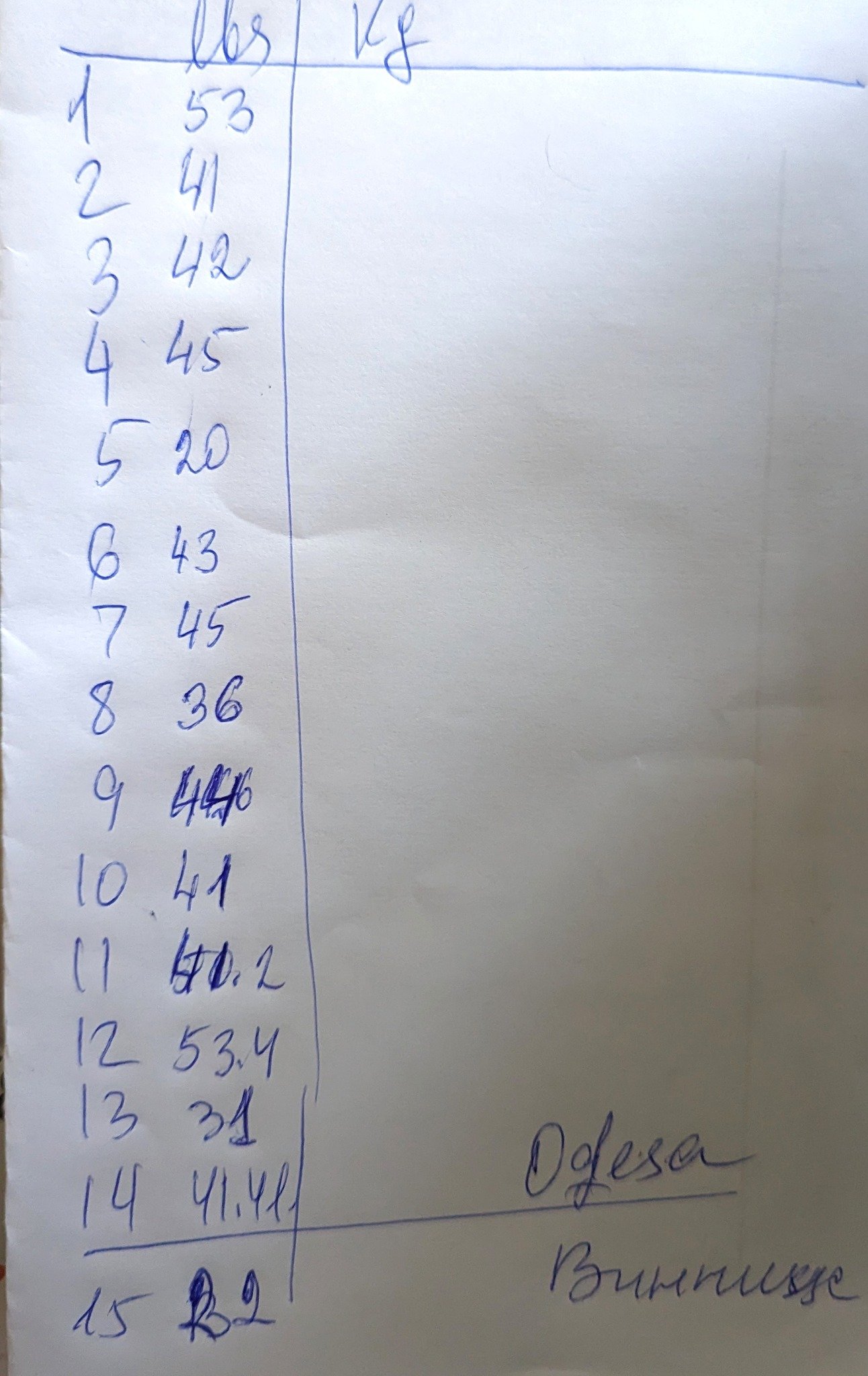
————————————————————————————————————
March 5 - March 6
Zaporizhzhia – Rzeszów
Total distance – 2551 km
Total cost – $958.54
We drove for 16 hours, slept for 6 hours, and then picked up an 86-year-old disabled woman and her daughter (who was her caretaker) for another 17 hours of driving. While on the way to our pickup, we suddenly realized that the following day (March 6) marked the one-year anniversary of our first deployment with GDRT. So, when we stopped for food and bought a bottle of honey wine to commemorate the occasion after we arrived at the base.
It is hard to believe it is already one year past.
————————————————————————————————————
February 27 – March 2
Lviv – Mykolaiv -Kherson-Odesa-Przemyśl
Total distance: ~2500km
Total cost: $949.71
This was an extremely efficient mission.
We picked up a load of humanitarian aid in Lviv (the cabin was loaded almost up to the roof), drove it up to Mykolaiv and unloaded most of it at the local volunteer's bunker. Then we took the rest of the aid to Kherson, where we heard shelling constantly. We were lucky to come between two major bombardments. We were able to unload the aid and pick up a family of four (the father and three kids), taking them to safety in Odesa. Arrived at Odesa late night.
Our next patient was a handicapped man who had no means of evacuation and told us that we were his last hope. Unfortunately, he was not ready yet, so we spent one day in the city, slept through the air raid, picked him up the next morning and were on our way. We brought him to our friend's Jay shelter and arrived at the base completely exhausted.
The next day was spent, as usual, on the repair/service for our ambulance. The Ukrainian roads almost destroyed Nika’s suspension, and we will have to take care about it very soon.
